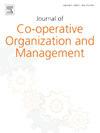当少不等于多:抑制合作社内部机会主义行为
IF 2.5
Q3 MANAGEMENT
Journal of Co-operative Organization and Management
Pub Date : 2025-04-11
DOI:10.1016/j.jcom.2025.100260
引用次数: 0
摘要
在欧盟的农业食品部门,大多数农场企业规模较小,强大的连锁行为者的机会主义行为是一个主要的市场挑战,合作社大大加强了其成员的议价地位。然而,机会主义在合作社内部也很常见,其主要形式是成员向竞争的连锁参与者侧销。由于副卖危及合作社的生存能力并持续存在,我们的目标是探索可能为解决方案提供信息的新先例。基于合作社作为社会团体和商业企业的双重性质,我们考察了解释人类合作的两种社会现象——信任和八卦——对合作社成员非法侧销行为的抑制作用。通过对48家合作社170名成员的调查数据,我们发现感知到的负面八卦抑制了非法侧卖,信任通过感知到的成员利益具有间接预防作用。综上所述,我们的研究结果促进了对合作社内部机会主义的认识,并可能对欧盟农业食品部门发展的关键利益相关者有价值。本文章由计算机程序翻译,如有差异,请以英文原文为准。
When less is not more: Restraining internal opportunistic behavior in cooperatives
In the European Union’s agri-food sector, where most farm businesses are small and the opportunistic behavior of powerful chain actors is a major market challenge, cooperatives substantially reinforce their members’ bargaining position. However, opportunism is also common within cooperatives, a dominant form of which surfaces when members side-sell to competing chain actors. As side-selling jeopardizes cooperatives’ viability and persists, we aim to explore novel antecedents that might also inform solutions. Motivated by the dual nature of cooperatives as a social group and a business enterprise, we examine the restraining influence of two social phenomena that explain why humans cooperate - trust and gossip - on members’ illegal side-selling behavior. With survey data from 170 members in 48 cooperatives, we find that perceived negative gossip curbs illegal side-selling, and trust has an indirect preventive effect through perceived member benefits. Taken together, our study’s findings advance the knowledge of internal opportunism in cooperatives and may prove valuable to crucial stakeholders for the development of the European Union’s agri-food sector.
求助全文
通过发布文献求助,成功后即可免费获取论文全文。
去求助
来源期刊
CiteScore
4.40
自引率
19.00%
发文量
27

 求助内容:
求助内容: 应助结果提醒方式:
应助结果提醒方式:


